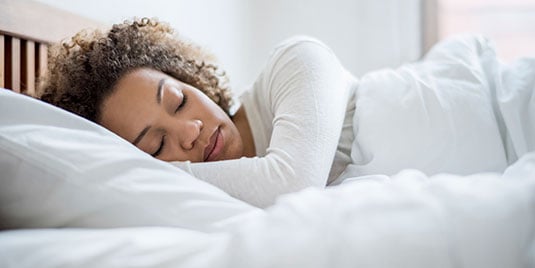Recognizing sleep disruptions as early warning signs of bipolar episodes can help you stay proactive, adjust treatments, and maintain mood stability.
Lying awake in my bed at night with my head spinning out of control is something I used to think was typical. I had labeled myself a person who had difficulty sleeping, and who probably always would. It was a very frustrating and hopeless feeling.
Now, years later, I recognize that my sleep issues are a red flag that my bipolar symptoms are becoming problematic. My psychiatrist has even instructed me, “Two nights without sleep, call me. Don’t wait a week.”
It has taken me a very long time to understand the relationship between sleep and my bipolar. In fact, I am still learning about this connection almost two decades later.
Recognizing That Changes in Sleep May Be Bipolar Symptoms
For the longest time, I simply thought I was an insomniac. That was my story. I couldn’t sleep.
Now, many years later — and with much more awareness of my bipolar symptoms — I have learned that my insomnia, and sometimes my hypersomnia, signals trouble ahead.
RELATED: Ask the Doctor: Why Sleep Is Essential For Bipolar Stability
Back when I was drinking alcohol, I didn’t notice my sleep problems as much, mainly because I drank so much that I just went to bed and passed out.
Once I got sober, my sleep life turned into one giant problem. The “solution” was constantly being prescribed sleeping pills … until, with the help of my counselor and psychiatrist, I finally connected the dots.
My psychiatrist explained to me that I do not actually have insomnia and that I wouldn’t need sleeping medicine if my bipolar symptoms were under control. According to her, my sleeping problems were symptoms of my bipolar disorder, not symptoms of insomnia.
I had never once thought of it that way before, but it made sense to me because when my moods were stable, and I had no signs of either depression or mania, my sleeping pattern was normal. My psychiatrist was right!
How a Change in Your Sleep Pattern Can Signal an Impending Mood Episode
A subtle change in my sleep pattern is the first sign of an impending mood episode. Whether it is mania or depression, my sleep is the first to suffer. It is like the initial alarm that something is not right with my bipolar disorder.
While I used to ignore these sleep changes and just throw my hands up in the air, now I know better. Through my mental health condition, I have learned to recognize the early warning signs of a mood episode, and, therefore, become proactive in dealing with it.
I can tell you from my experience that excessive sleeping is not always a sign of depression, nor is not sleeping enough always a sign of mania. Yes, this can be the case, but countless times, my tossing and turning — and not being able to sleep —- has been a strong indicator of depression coming on. This is an early sign of depression for me, and once the depression has struck, then excessive sleeping usually sets in.
However, I now recognize my insomnia early on and work with my psychiatrist to make small changes in my medication dosages. Sometimes, I can fend off depression completely. Other times, I can at least significantly reduce the severity.
Keep Track of What Leads Up to Symptoms of Depression or Mania
Being proactive — and knowing my very specific signs for an approaching mood episode — has been very important in maintaining more stability with my bipolar disorder. I believe that everyone has small, maybe very subtle, signs of an impending shift in mood.
RELATED: Ask the Doctor: Sleep Strategies to Help Your Bipolar Symptoms
I encourage everyone struggling with bipolar to be very aware of what happens before they sink into a depression or are thrown into a mania. This takes mindfulness, patience, and self-awareness. It also helps to work with professionals who are in tune with your specific details, instead of those who just have a general understanding of bipolar disorder.
By paying attention to my specific sleep patterns, I am more able to recognize potential shifts in mood, which means I can be more proactive about managing my bipolar. Having some sense of control in what often feels like such an overwhelming and helpless disorder has led to greater feelings of empowerment in my life, as well. And I hope it does the same for you.
UPDATED: Originally posted February 20, 2020


